Publications
-
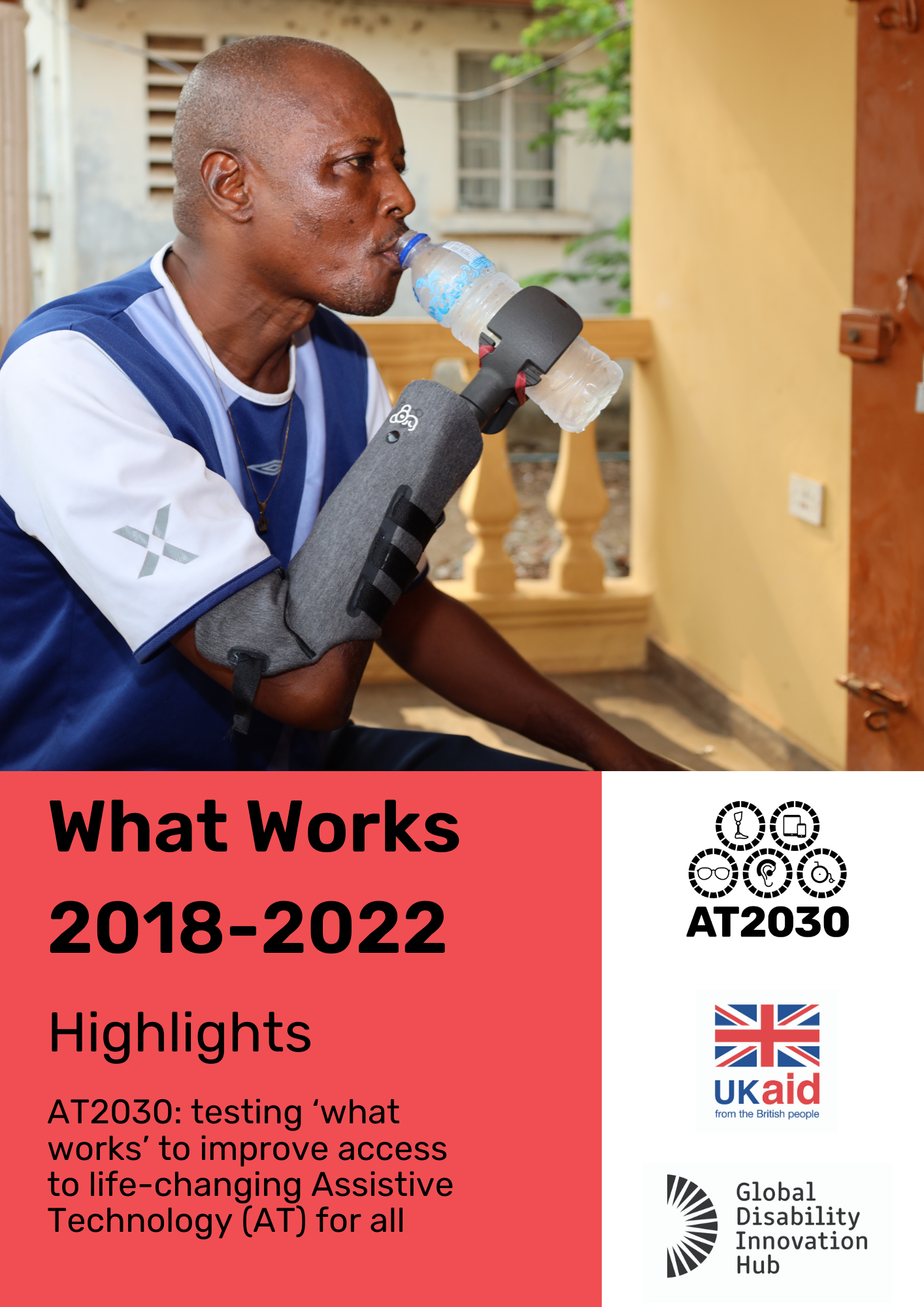
'What Works' highlight report
Global Disability Innovation HubJune 13, 2023GlobalAT2030 ResourcesA key highlights document of 'What Works' to improve access to life-changing Assistive Technology (AT) for all. This report succinctly summarises the past five-years of the AT2030 programme, a £40 million programme funded by UK aid.
-
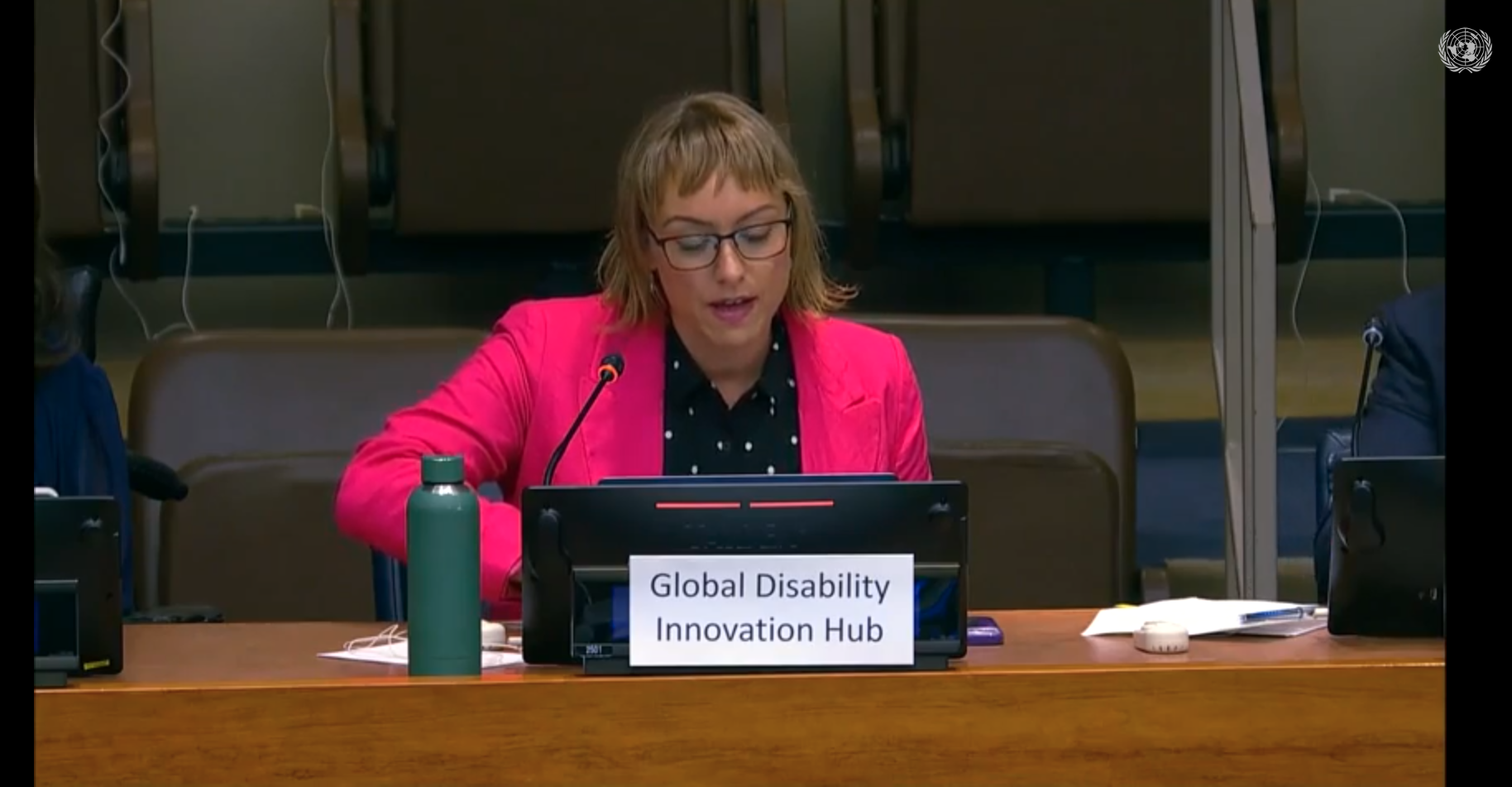
What Works' to improve access to life-changing Assistive Technology (AT) for all (COSP 16 side event recording )
Global Disability Innovation HubJune 13, 2023GlobalAT2030 ResourcesThis side event brought together key stakeholders and experts working across the AT arena, with the aim of enabling researchers, innovators and AT users to experiment with new ideas.
-
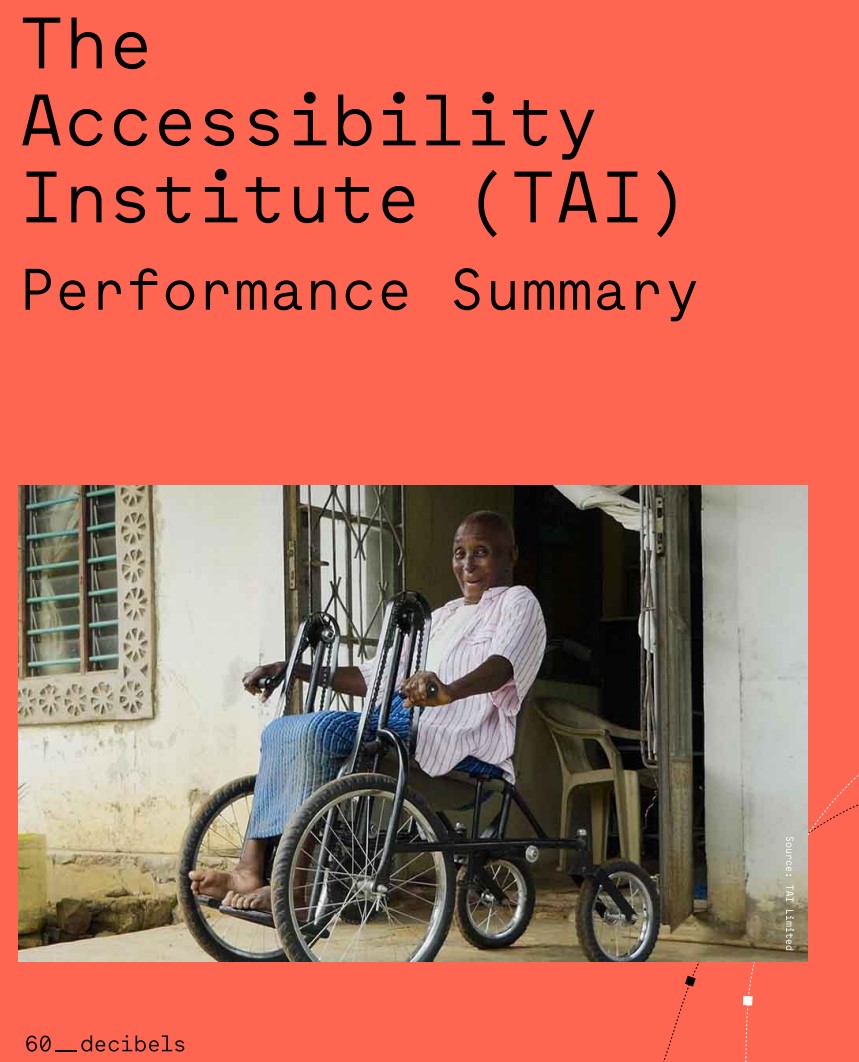
The Accessibility Institute Impact Performance Snapshot
Global Disability Innovation Hub, 60DecibelsJune 12, 2023Case Studies and ReportsThis report, developed by 60Decibels and Global Disability Innovation Hub, explores more about the Accessibility Institute’s customers, their profiles, outcomes and experiences - looking at key performance and impact metrics to discover customer loyalty, feedback and overall impact to lives.
-
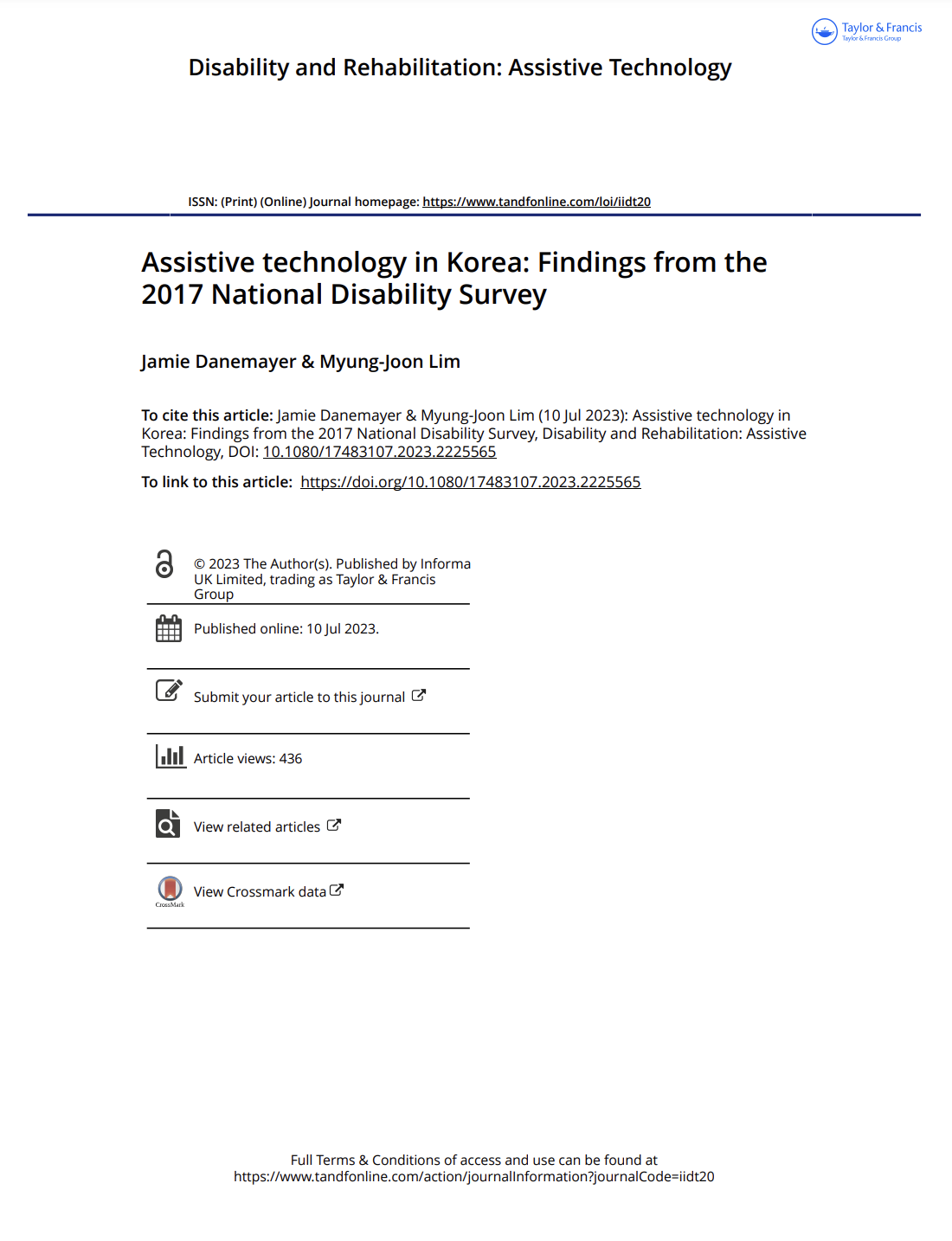
Assistive technology in Korea: Findings from the 2017 National Disability Survey
Jamie DanemayerJune 10, 2023KoreaCase Studies and ReportsThis publication explicitly monitoring the need, use and satisfaction of assistive product (AP) provision is essential to support population health and healthy longevity in ageing/aged countries, like Korea. We present findings from the 2017 Korea National Disability Survey (NDS) on AP access and compare them to international averages, introducing Korea’s data into the wider coherence of global AP research.
-
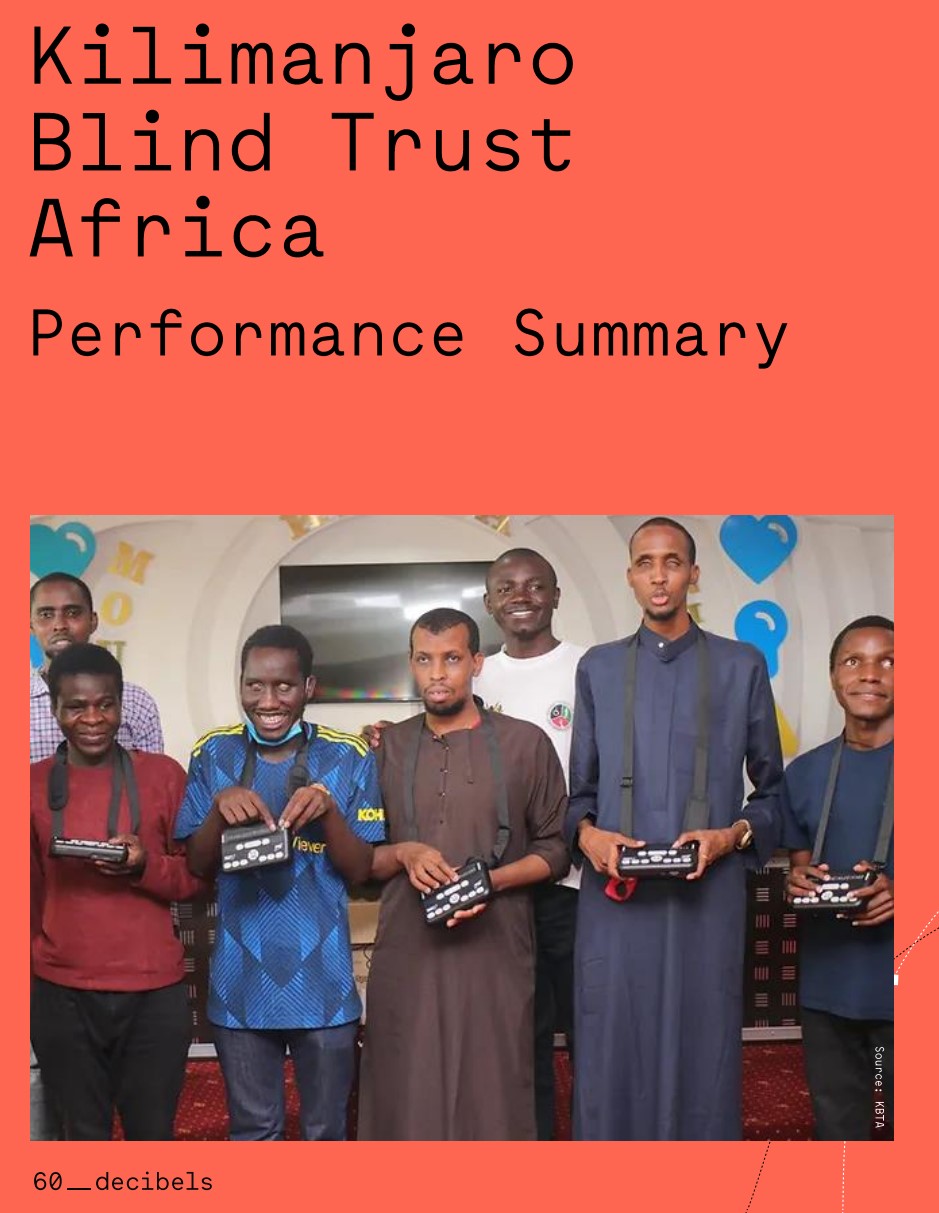
KBT Impact Performance Snapshot
Global Disability Innovation Hub, 60DecibelsJune 8, 2023Case Studies and ReportsThis report, developed by 60Decibels, explores more about Kilimanjario Blind Trust customers, their profiles, outcomes and experiences - looking at key performance and impact metrics to discover customer loyalty, feedback and overall impact to lives.
-
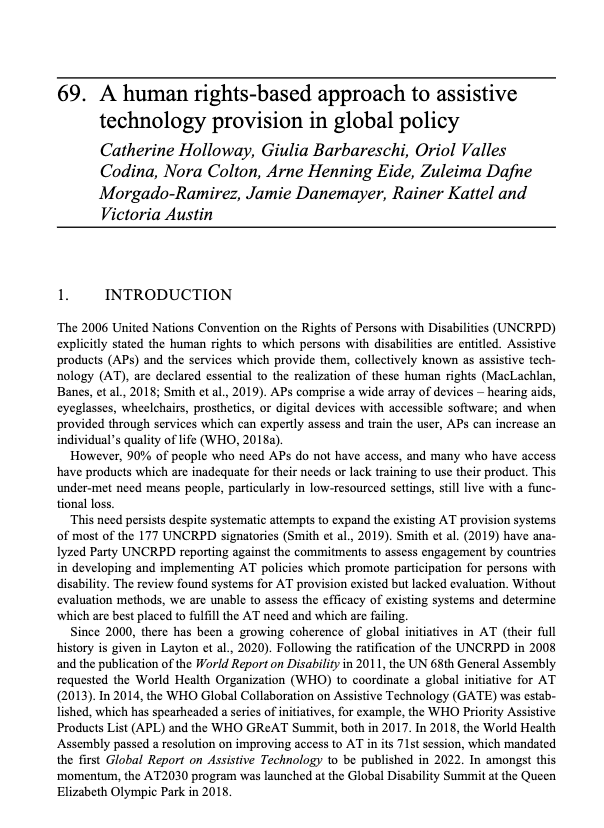
A human rights-based approach to assistive technology provision in global policy
Vicki Austin, Catherine Holloway, Jamie Danemayer, Rainer Kattel, Giulia Barbareschi, Zuleima Dafne Morgado-Ramirez, Oriol Vallès Codina, Nora Colton, Arne Henning EideJune 8, 2023Academic Research PublicationsThis research argues that assistive technology (AT) is a human right essential for the meaningful participation of disabled individuals in society, yet global inequities in access persist. It examines the opportunities and challenges in creating a policy framework to ensure affordable, high-quality AT access. By reviewing healthcare technology access challenges and focusing on the Norwegian AT system, the chapter highlights recent policy advancements and new data collection methods that demonstrate AT's impact. It concludes by discussing how innovation and disability policy can enhance the availability, affordability, and effectiveness of AT, thereby increasing its social and economic benefits.
-
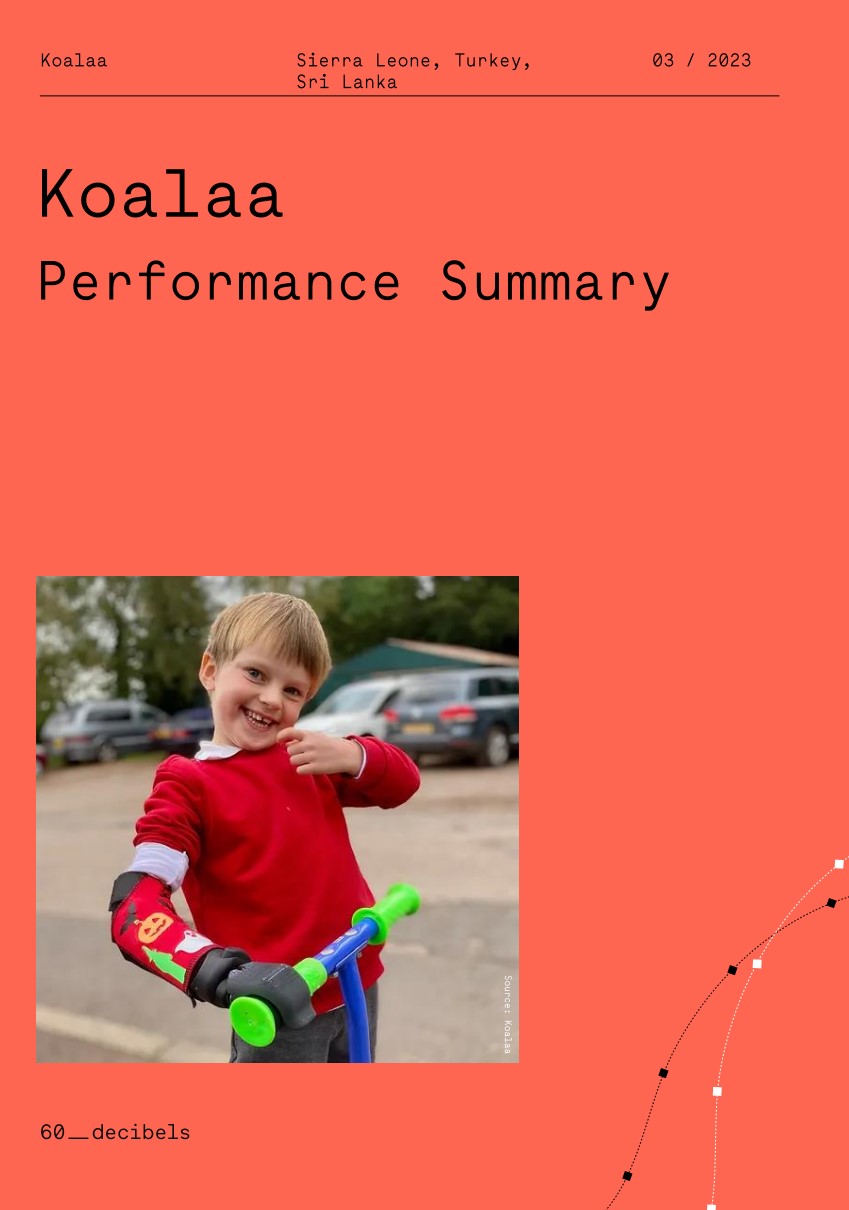
Koalaa Impact Performance Snapshot
60Decibels, Global Disability Innovation HubJune 6, 2023Case Studies and ReportsThis report, developed by 60Decibels, explores more about Koalaa customers, their profiles, outcomes and experiences - looking at key performance and impact metrics to discover customer loyalty, feedback and overall impact to lives.
-
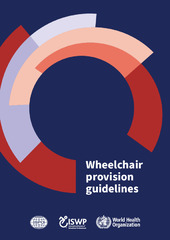
Wheelchair provision guidelines
World Health OrganizationJune 5, 2023GlobalAT2030 ResourcesThese Wheelchair provision guidelines aim to support improved access to appropriate wheelchairs, for all those in need, including children, older persons, people with mobility disabilities, and those with chronic health conditions.
-
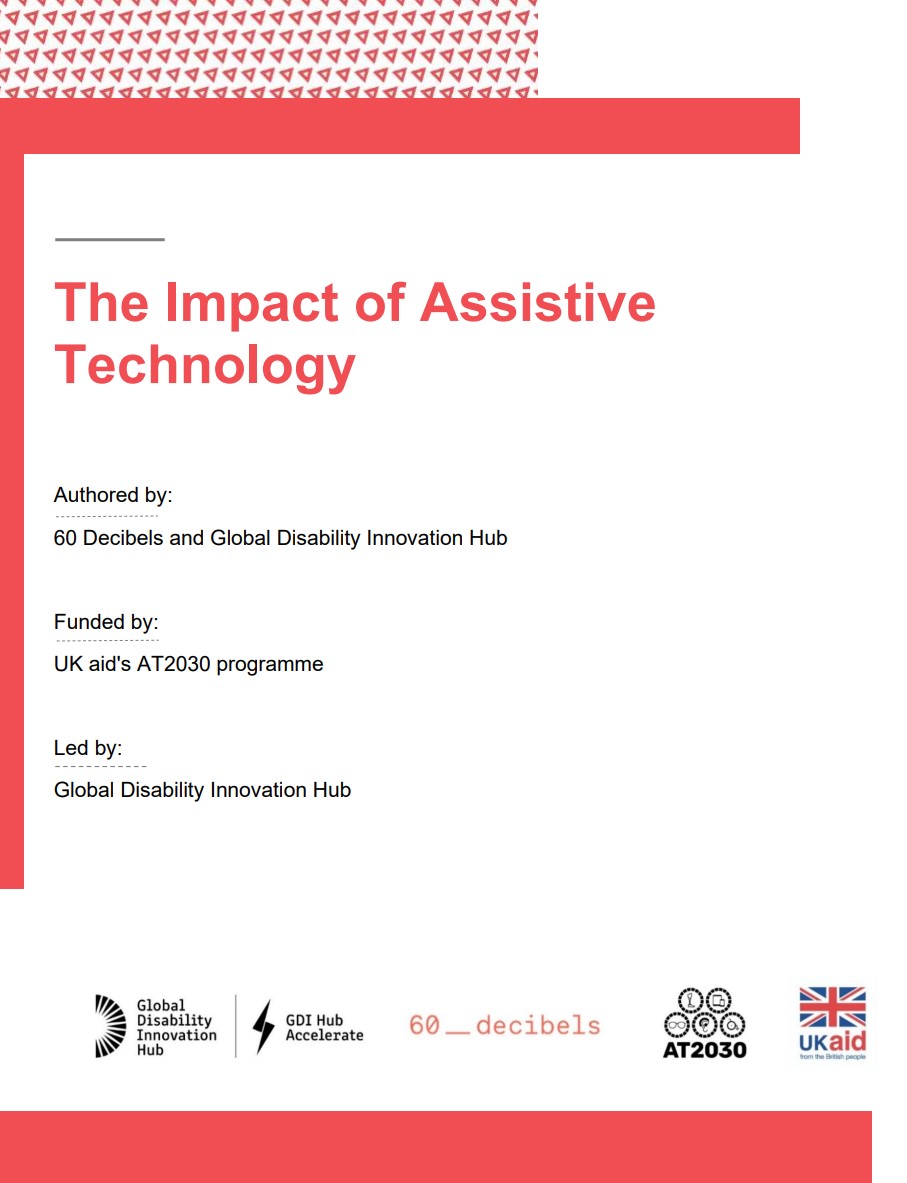
The Impact of Assistive Technology
60Decibels, Global Disability Innovation HubJune 2, 2023Case Studies and ReportsThere is a need to create data and evidence for the AT sector. The current data vacuum is challenging venture but also ecosystem growth. At the ecosystem-level the lack of data and evidence creates a significant barrier for the sector to make informed decisions about where and when to invest. The objective of this research was to develop an easily administrable set of surveys – AT Lean Impact Assessment Suite – which would capture company-level impact for emerging AT companies from the users’ perspectives whilst simultaneously delivering ecosystem-wide learnings.
-
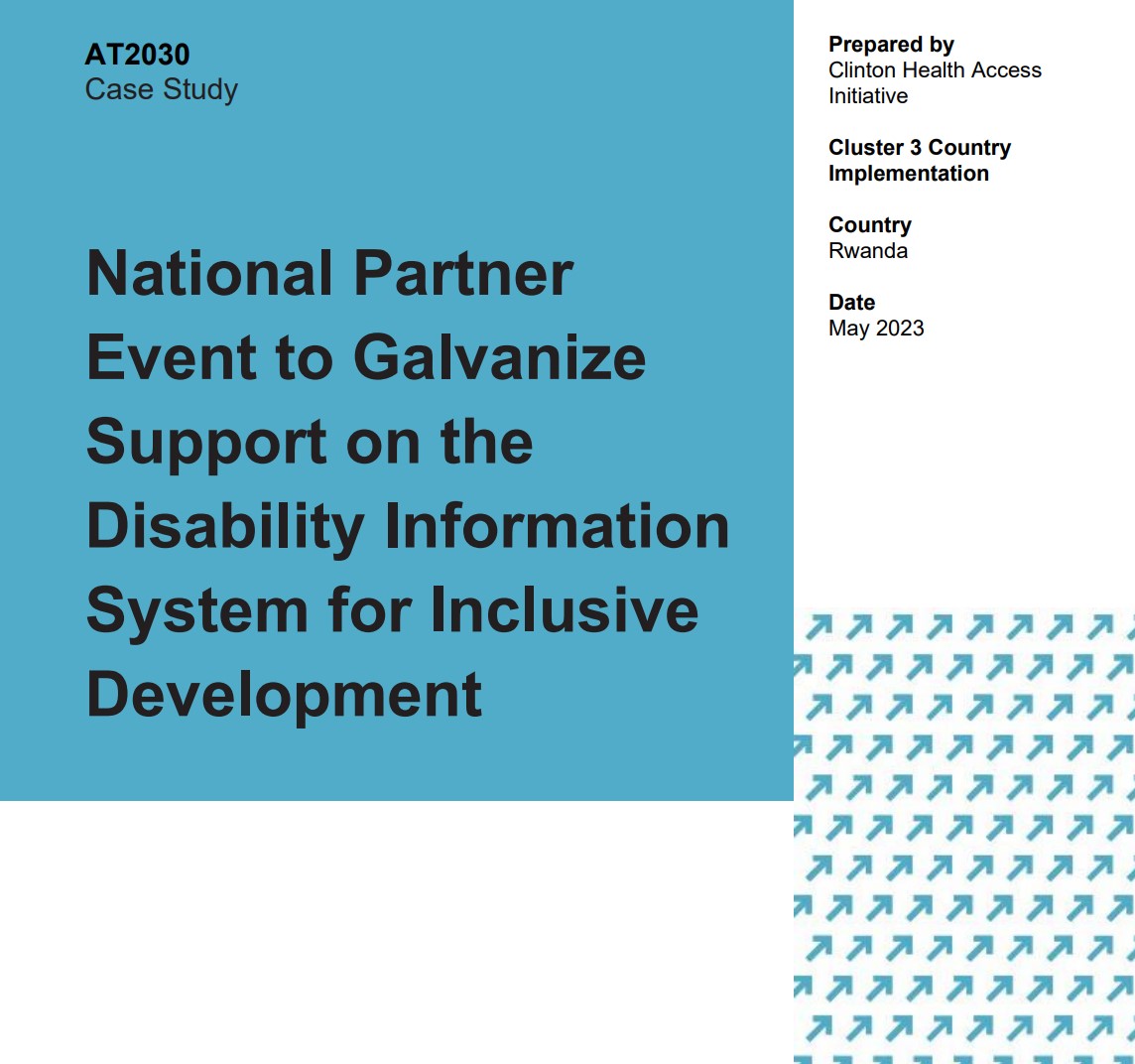
Rwanda national partner event to galvanise support on the Disability Information System for Inclusive Development
Clinton Health Access InitiativeMay 24, 2023RwandaCase Studies and ReportsThis case study explores a recent National Partner event led by the Rwandan National Council of Persons with Disabilities (NCPD) and its stakeholders to build support on the Disability Information System for Inclusive Development. This system aims to provide evidence-based support for inclusive policies, enhance accountability, improve service delivery, and foster better coordination among key stakeholders. Ultimately, the goal is to enhance management of disability information in the country.
-
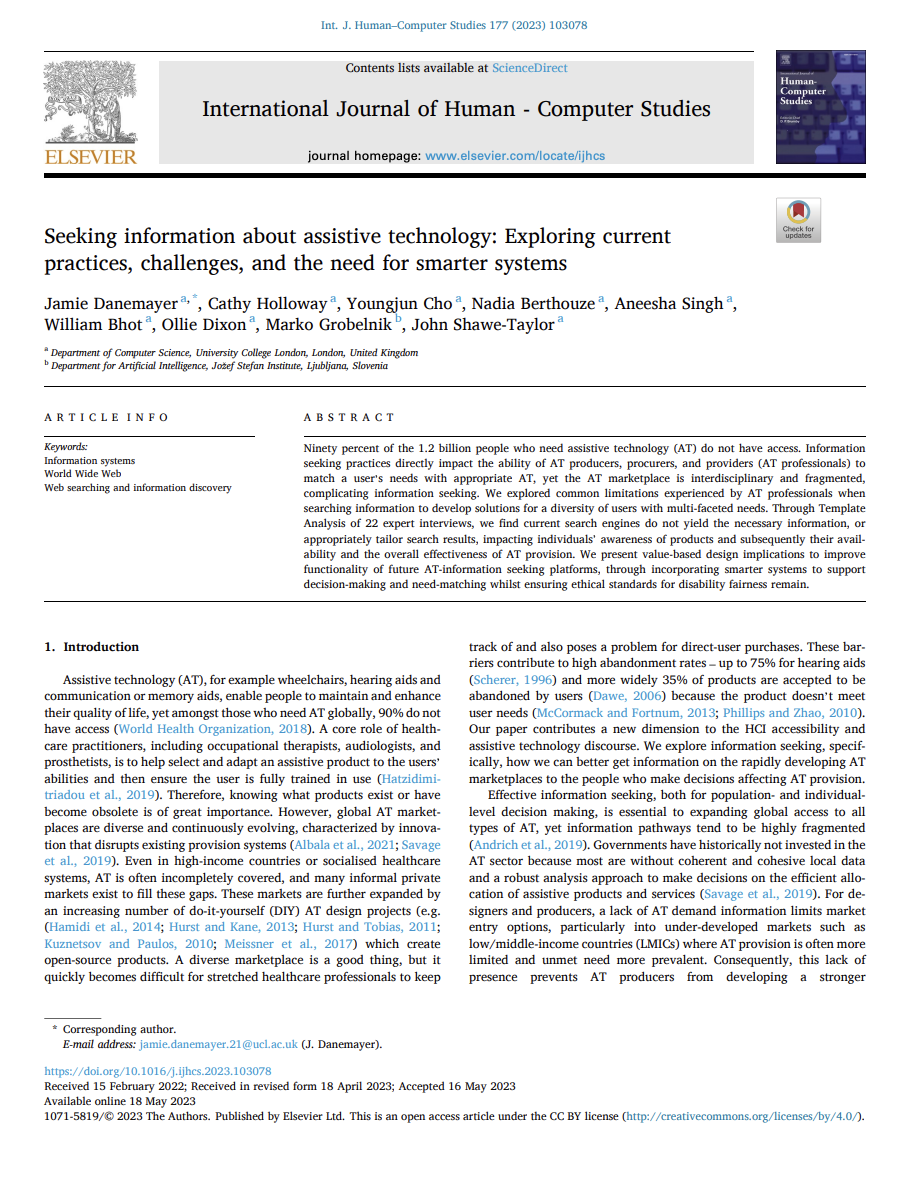
Seeking information about assistive technology: Exploring current practices, challenges, and the need for smarter systems
William Bhot, Catherine Holloway, Jamie Danemayer, Prof. Youngjun Cho, Aneesha Singh, John Shawe-Taylor, Nadia Berthouze, Ollie Dixon, Marko GrobelnikMay 18, 2023GlobalAcademic Research PublicationsThis paper presents value-based design implications to improve functionality of future AT-information seeking platforms, through incorporating smarter systems to support decision-making and need-matching whilst ensuring ethical standards for disability fairness remain.
-

Government of Sierra Leone National Assistive Technology Procurement Guidelines of Sierra Leone
Ministry of Health and Sanitation Sierra LeoneApril 19, 2023Sierra LeoneAT2030 ResourcesProcurement guidelines which seek to standardize the procurement process of AT products for Sierra Leone.
-
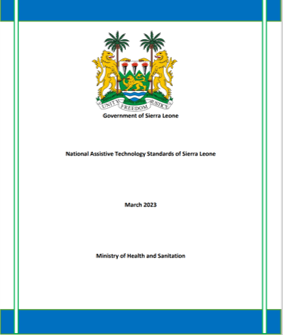
National Assistive Technology Standards of Sierra Leone
Ministry of Health and Sanitation Sierra LeoneApril 19, 2023Sierra LeoneAT2030 ResourcesThis document was developed to guide the procurement of assistive products in Sierra Leone. It is intended primarily for procurement teams, implementing partners and donors working on providing AT devices for all forms of disabilities.
-
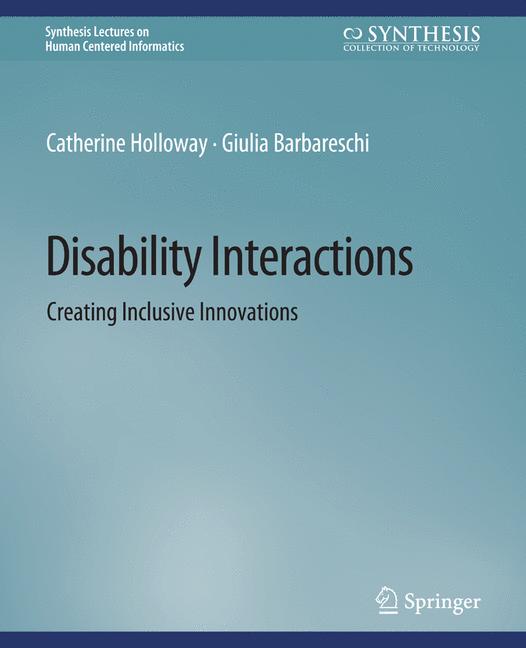
Case Study: DIX within the AT2030 program in Kenya
Catherine Holloway, Giulia BarbareschiApril 11, 2023Case Studies and ReportsCase Study: DIX within the AT2030 program in Kenya. Excerpted from Disability Interactions: Creating Inclusive Innovations by Catherine Holloway and Giulia Barbareschi.
-

Case Study: Local Production Opportunities for Assistive Technology
Catherine Holloway, Giulia Barbareschi, Dr Ben OldfreyApril 11, 2023Case Studies and ReportsCase Study: Local production opportunities for Assistive Technology. An excerpt from Disability Interactions: Creating Inclusive Innovations by Catherine Holloway and Giulia Barbareschi
-

Case Study: Enabling Access to Quality, Inclusive Education for Learners with Visual Impairment in Africa
Catherine Holloway, Giulia Barbareschi, Kilimanjaro Blind TrustApril 11, 2023Case Studies and ReportsCase Study: Enabling Access to Quality, Inclusive Education for Learners with Visual Impairment in Africa. Excerpted from Disability Interactions: Creating Inclusive Innovations by Catherine Holloway and Giulia Barbareschi.
-

Case Study: Motivation InnovATe Wheelchairs, Reimagining Bespoke Wheelchair Manufacturing Through Technology
Catherine Holloway, Giulia Barbareschi, Jake Honeywill, Nancy MbuguaApril 11, 2023Case Studies and ReportsCase Study: Motivation InnovATe Wheelchairs, Reimagining Bespoke Wheelchair Manufacturing Through Technology. An excerpt from Disability Interactions: Creating Inclusive Innovations by Catherine Holloway and Giulia Barbareschi.
-

Case Study: Google Euphonia, Supporting People with Impaired Speech to be Better Understood
Catherine Holloway, Giulia Barbareschi, Richard CaveApril 11, 2023Case Studies and ReportsCase Study: Google Euphonia, Supporting People with Impaired Speech to be Better Understood. Excerpted from Disability Interactions: Creating Inclusive Innovations
-

Case Study: Neurodiversity and Disability—Reflections
Catherine Holloway, Giulia Barbareschi, Dafne Zuleima Morgado RamirezApril 11, 2023Case Studies and ReportsCase Study: Neurodiversity and Disability—Reflections. Excerpted from Disability Interactions: Creating Inclusive Innovations.
-
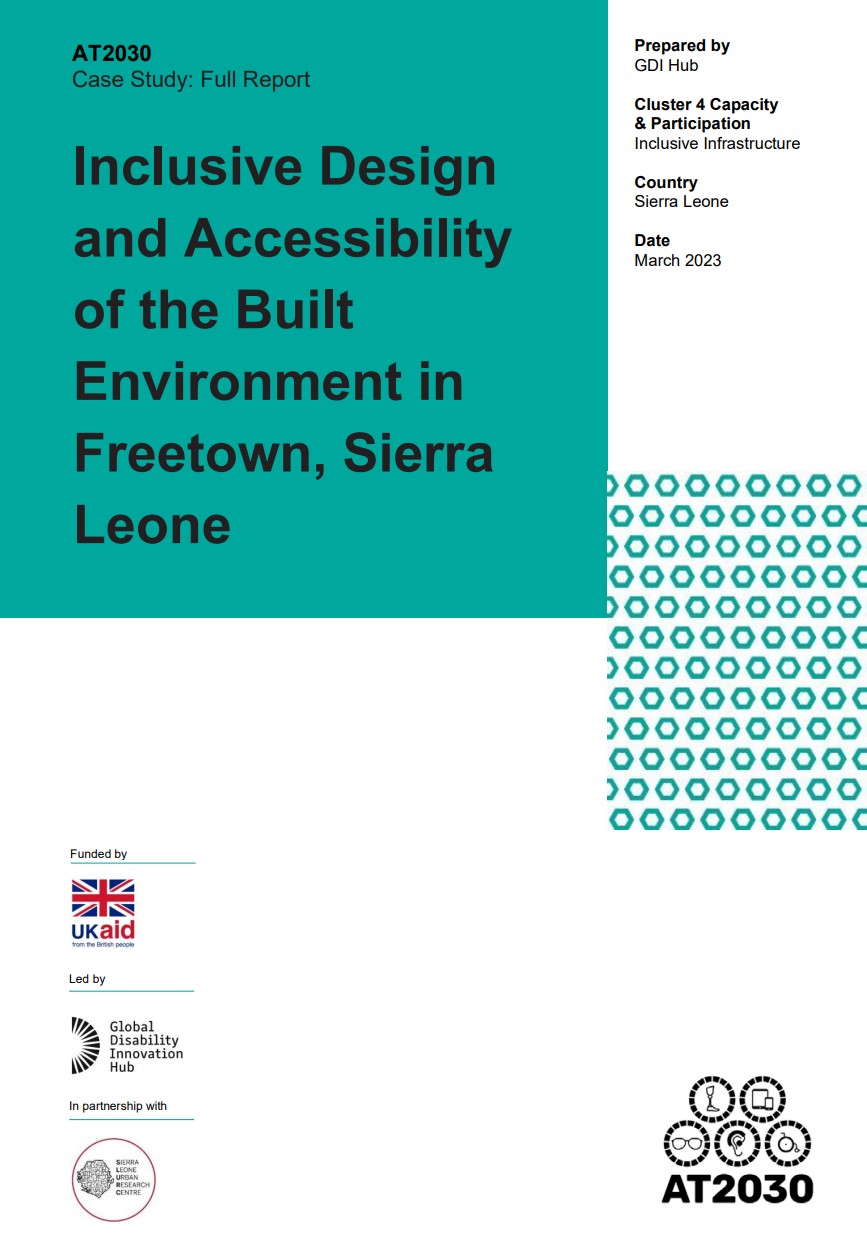
Inclusive Design and Accessibility of the Built Environment in Freetown - an Inclusive Infrastructure Case Study from Sierra Leone
Global Disability Innovation Hub, SLURCApril 11, 2023Sierra LeoneCase Studies and ReportsThis case study explores the current state of the infrastructure provision - and makes recommendations for opportunities to imbed accessibility and inclusion across Freetown.
Previous PageNext Page